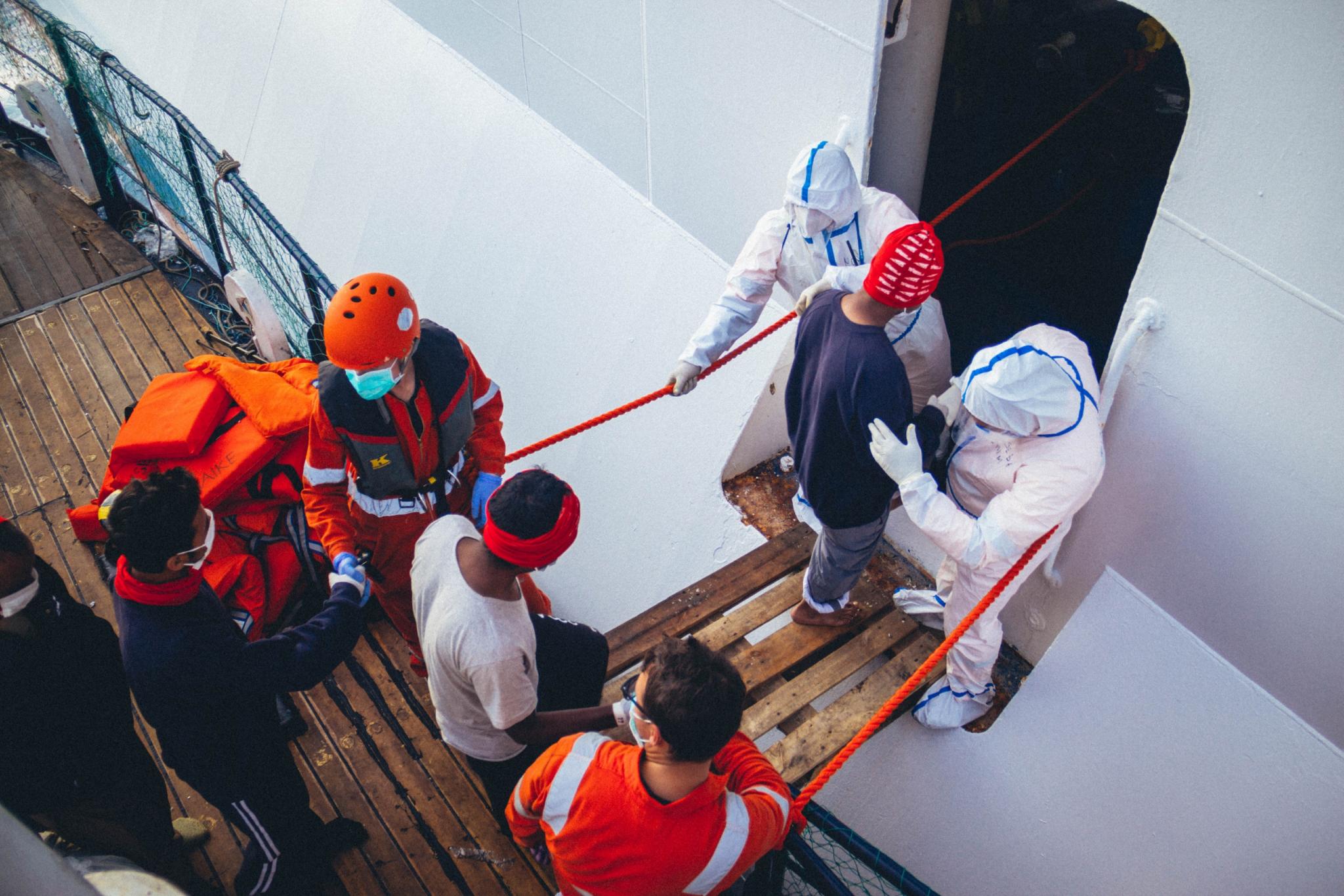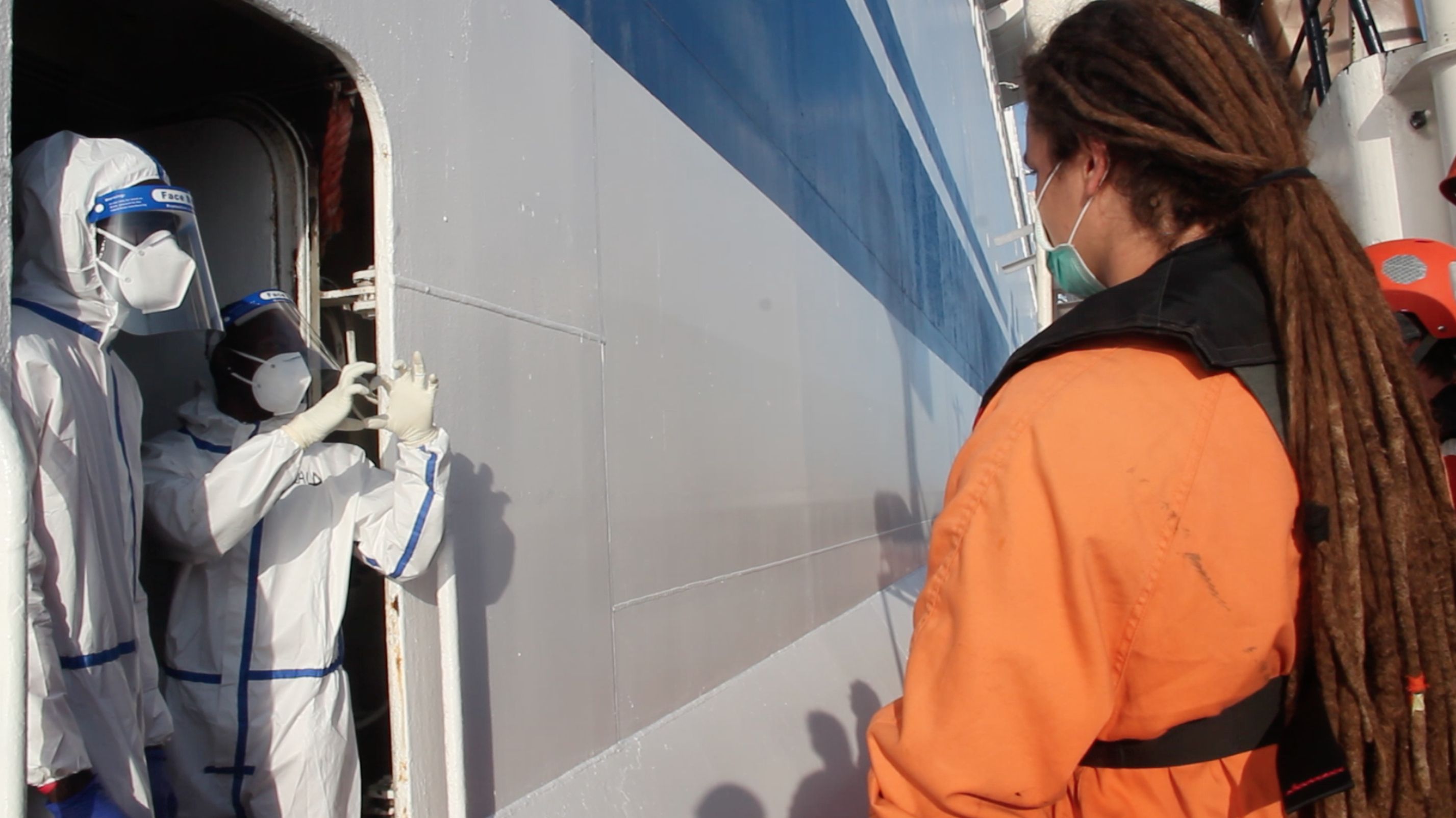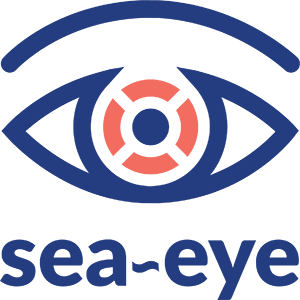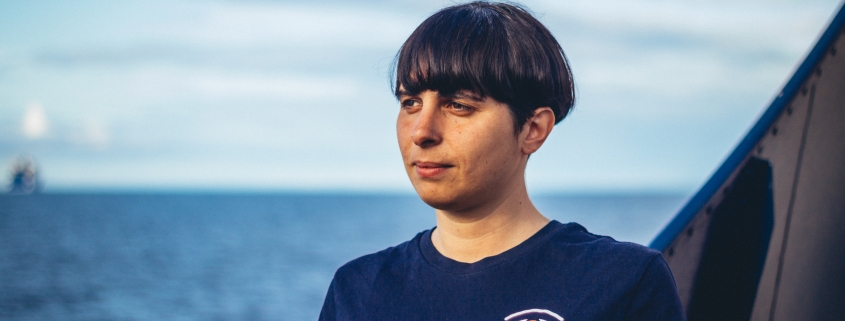After the quarantine is before the quarantine
Interview with Caterina, board doctor on the ALAN KURDI
Sea rescue in the time of the pandemic. After the dramatic events on the ALAN KURDI, it now lies at anchor in the bay of Palermo. 14 days of obligatory break. Also on board is Caterina, a doctor from Berlin. We spoke with her.
Let us start with a seemingly trivial question, but which does carry special significance in times of the pandemic. How are you?
(laughs) Yes, that is difficult. I’m alright, even though we still have to stay another week aboard the ALAN KURDI. The mission was exhausting but went well in the end. I can’t say I am feeling super good, but everyone on board is nice. That is worth a lot.
After last week’s dramatic events, you are now condemned to inactivity. How does one deal with this?
It is a really strange situation for me. After the refugees – our guests – were transferred, I was thinking at first that it had not even happened. We were done, completely worn out. We had barely slept while our guests were on board, and so at first, we were just tired (Editor’s note: the crew picked up 150 refugees on April 6 and handed them to the Italian Red Cross on April 17). Much of it I cannot really grasp yet or deal with psychologically. To truly process this, we have to leave the ALAN KURDI first (During the stay, there were two suicide attempts among the guests).

How is the mood on board and what do you do all day?
We keep busy with smaller tasks, tidy up the ship, take stock of everything. Small repairs like paint jobs are due. Everything we can do at sea. The mood is good.
Now you are in quarantine for 14 days on the ship, and once you get onto land, the next one comes. Do you have understanding for this?
I believe we do not have to be quarantined again in Italy, but when I return to Berlin, then yes. Of course, I am not alone during the trip, and there is risk of infection. Insofar I do understand. Even though I am not really looking forward to another quarantine in Berlin. My apartment in Berlin Mitte has no balcony, and when you look outside, you only see another building. I could imagine nicer circumstances, but that’s just how it is now.
All the refugees were tested negative for coronavirus. Does this reassure you?
Yes, that is pretty good news. The guests aboard the AITA MARI too, (Editor’s note: this ship of a Spanish NGO rescued 43 refugees from the Mediterranean, who were transferred to the Italian ferry as well) were tested negative for the virus. Yes, that is good news.
What would you have done in the case of a COVID-19 outbreak?
There had been a guideline from Sea-Eye in advance for what was to be done in case of an infection with the coronavirus. We would have isolated the patients, and these would have been cared for exclusively by me and the paramedic. Thus, we would have tried to stop the spread. While hoping, of course, that no complications would arise that we could not have treated on board.

Sea rescue in the time of the pandemic. Is that a responsible thing to do?
Yes, this question has been posed to me often already. People who flee war and misery want to leave their country. Many of them have already been on the move for years, in the absence of human rights. They flee from torture, hunger and destitution. They want to live in safety. Even a pandemic won’t stop them. You know, I am Italian by birth. The situation in my home country is extremely tense due to the Corona-crisis. Everyday, I talk to my family there, with my relatives. I do not disregard this or ignore it. But the refugees, too, have a right to a better life. We need to help these people. We cannot just let them drown.
Will you continue nonetheless?
Yes! I continue nonetheless, yes. What we did, also during this mission, is necessary. During this period, people died. They logged a distress call and because nobody helped, they drowned. We already had 150 people on board and could not help anymore. But no one else came. Something like this must not happen. Regardless of the pandemic.
Are you afraid of an infection?
No. When I end this mission, I will work in the hospital again. There, the likelihood is relatively high that I get infected. The danger to be infected with the coronavirus is greater as a doctor in a hospital or as a customer in a supermarket, than as a doctor aboard the ALAN KURDI.
What is the first thing you’ll do once back in Berlin?
Well, what I would like to do is see my friends, drink a beer together by the riverside. But all of this will not be possible this quickly. When I think about that it is spring now in Berlin, that the weather is nice, then I want to go to the open-air cinema, to all the cultural possibilities. But for all of this, we will still have to wait a while.
(Martin Geiger)



